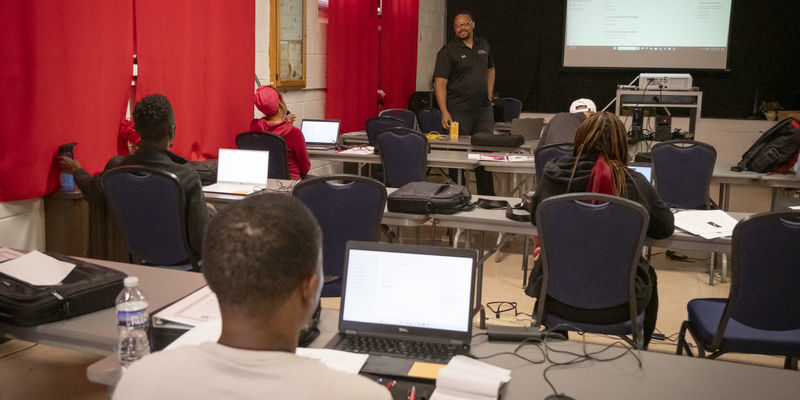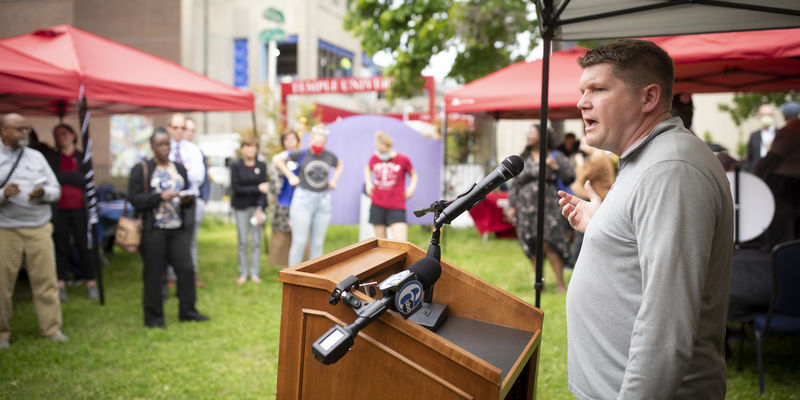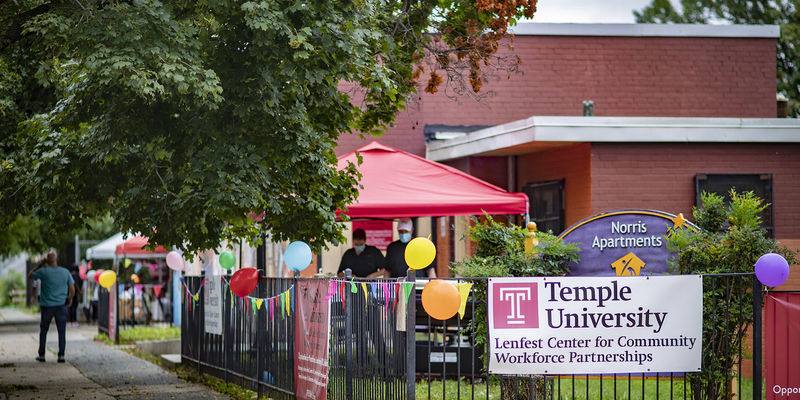Temple University hosts 10th annual Technology Learning Collaborative Conference
Temple President Richard Englert provides welcoming remarks during the TLC conference.

The Technology Learning Collaborative (TLC) is a professional development collaboration of organizations and advocates that drive digital literacy, access and inclusion in Philadelphia.
The organization held its annual conference on Oct. 10 at Temple University’s Howard Gittis Student Center. This year’s conference theme focused on creating a sustainable digital equity movement rooted in ensuring that people have access to the information technology services that enable them to connect with key employment, educational and healthcare opportunities.
This marked the third TLC conference held at Temple during National Digital Inclusion Week, which is recognized Oct. 7 through Oct. 11. The daylong event featured keynote speeches, breakout sessions and networking opportunities.
Temple’s Digital Equity Center, which specializes in providing computers and digital literacy training to community residents, is affiliated with TLC.
Temple University President Richard Englert gave welcoming remarks at the conference.
“I’m so impressed that the Technology Learning Collaborative has evolved into a forum for doing what really is important: exchanging ideas, exploring trends, and especially shaping the future of education and learning,” Englert said.
He addressed how Temple’s and the TLC’s missions are aligned. “Clearly what you’re doing dovetails very much with us because we are very devoted to empowering individuals and serving the community,” Englert told the TLC’s members. “That’s what you do. You bridge gaps in digital access, and you do something that is very near and dear to our hearts at Temple University. You promote equity.”
Englert congratulated TLC for its accomplishments in providing digital literacy programming, career and educational training, and technology access. His presentation was followed by City Councilmember Rue Landau, who said she sees digital equity as one of Philadelphia’s most urgent issues.
“The digital divide is real. It impacts how people access education, healthcare and basic services,” said Landau, who is the chair of council’s Technology and Information Services Committee.
“All Philadelphians, no matter their background or zip code, should have access to the tools or resources that they need to be in the digital world. That’s why National Digital Inclusion Week is so important,” she continued. “It reminds us that digital equity requires an ongoing effort and collaboration.”
Landau presented TLC Executive Director Kate Rivera with a City Council citation. Rivera addressed how the organization’s work in Philadelphia helps shape what happens on the local, state and national level.
“As many of you know, the federal government is making a historic investment in broadband and digital equity, which means that this is an exciting time for our work and in order to maximize this investment we need to be planning now to design digital equity programs that have significant long-term impacts on the lives of participants,” she said. “We need to be thinking about how to sustain the work after the infusion of federal funding comes to an end.”
Her remarks were followed by a panel discussion featuring panelists who provided perspectives on the importance that digital literacy has on their organizations’ work.
Anuj Gupta, president of The Welcoming Center, a nonprofit that focuses on the economic opportunities of foreign-born residents, spoke on the growth of Philadelphia’s immigrant community. He says projections indicate that by 2025, almost 25% of the city’s population will be foreign-born.
“That is the growth base of our workforce,” Gupta explained. “If we don’t provide a foundational grounding in digital literacy, we not only stunt their growth, we stunt our collective economic growth.
“It’s realizing the demographic trajectories that we’re seeing for this city and region and understanding what that means for our workforce,” he continued. “Digital literacy becomes part and parcel of that strategy.”
Danae Mobley, executive director of 1Philadelphia and CEO of Coded by Kids, highlighted how these organizations are working to help underrepresented people gain access to opportunities in technology. Coded by Kids specializes in providing tech education to underserved young people. 1Philadelphia is a coalition of stakeholders who are working to make the city a model of equitable tech and innovation.
Mobley says when Coded by Kids talks about preparing young people for technology careers, they use the analogy of how professional athletes are developed. “They don’t wake up in the 12th grade and decide, ‘Oh I’m going to the NBA.’ This is an intentional effort that happens over a long period of time and that is same strategy and thought pattern we talk about with 1Philadelphia,” she explained. “If we’re going to create true digital citizens out of Philadelphians, it’s a long-term strategy that starts all the way with access and equity, all the way through K–12 education.”
Caitlyn Brazill, chief revenue officer of Per Scholas, offered insight on how the national organization is helping to create economic mobility. Per Scholas provides no-cost professional tech training to underserved communities and creates pathways to well-paying jobs. The organization has partnered with about 1,000 employers across the U.S. to create entry and mid-level talent pipelines and advance their tech workforce.
“It’s important to acknowledge this foundation of digital literacy because it underpins our ability to do any of our work,” Brazill explained. “When folks come into Per Scholas they have to have a base level of knowledge and comfort in digital literacy that we can then build upon.”


